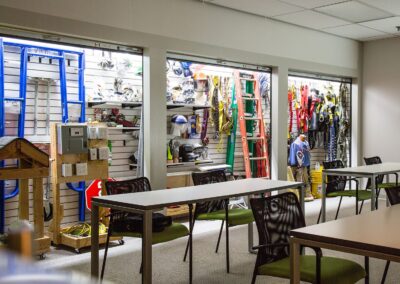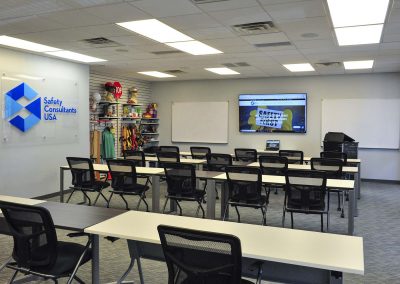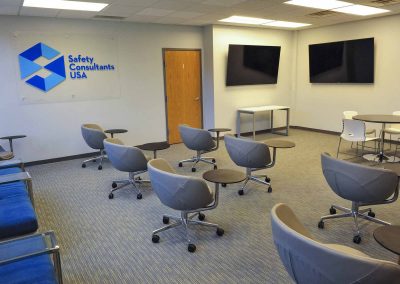OSHA Safety Training Birmingham AL
OSHA Safety Training serving in Birmingham AL
Safety Consultants USA location at Birmingham, AL
Atlanta GA
Safety Consultants USA
8100 Roswell Road
Suite 410
Atlanta, GA 30350
Phone: 1.866.506.4229
Fax: 1.770.769.2115
Email: contact@safetyconsultantsusa.com
OSHA Safety Training classes for companies in Birmingham AL
• Aerial & Scissor Lift
• Confined Space
• Crane Rigger & Signal
• Excavation & Trenching
• Fall Protection
• Fire Safety
• First Aid, CPR & Bloodborne Pathogens
• GHS/Hazard Communication
• HAZWOPER 24-Hour
• HAZWOPER 40-Hour
• HAZWOPER Supervisor 8-Hour
• Lockout/Tagout
• Machine Guarding
• OSHA 10-Hour for Construction
• OSHA 10-Hour for General Industry
• OSHA 30-Hour for Construction
• OSHA 30-Hour for General Industry
• Powered Industrial Truck (Forklift)
• Respiratory Protection
• Scaffolding
• Respirable Crystalline Silica
• Workplace Violence
Other services that Safety Consultants USA provides for companies in Birmingham AL
- OSHA Safety Consulting
- Facility and Jobsite Safety Assessments
- Written Health and Safety Programs
- Safety Staffing
- OSHA Citation Defense
- Workers Compensation Claims Management
- ISNetworld, Browz and Avetta Compliance Assistance
- Lockout/Tagout Procedure Development & Annual Review
- Activity Hazard Analysis
- Hearing Conservation
- Job Safety Analysis
- Site Specific Safety Plan
- Contractor Prequalification
Birmingham City, Alabama
Birmingham ( BUR-ming-ham) is a city in the north central region of the U.S. state of Alabama. With an estimated population of 209,403 in 2019, it is the second most populous city in Alabama. Birmingham is the seat of Jefferson County, Alabama’s most populous and fifth largest county by area. As of 2018, the Birmingham-Hoover Metropolitan Statistical Area had a population of 1,151,801, making it the most populous in Alabama and 49th-most populous in the United States. Birmingham serves as an important regional hub and is associated with the Deep South, Piedmont, and Appalachian regions of the nation.
Birmingham was founded in 1871, during the post–Civil War Reconstruction era, through the merger of three farm towns, most notably Elyton. The new city was named for Birmingham, England, the United Kingdom’s second largest city and then a major industrial city. The Alabama city annexed its smaller neighbors as it developed into a major industrial center based on mining, the iron and steel industry, and rail transport. Most of the original settlers were of English ancestry. The city was developed as a place where low paid, non-unionized immigrants (mainly Irish and Italian), along with African-Americans from rural Alabama, worked in the city’s steel mills and blast furnaces and gave it a competitive advantage over unionized industrial cities of the Midwest and Northeast.
From its founding through the end of the 1960s, Birmingham was a primary industrial center of the southern United States. Its rapid growth from 1881 through 1920 earned it the nicknames “The Magic City” and “The Pittsburgh of the South”. Its major industries were iron and steel production. Major components of the railroad industry, including rails and railroad cars, were made in Birmingham. The two primary hubs of railroading in the “Deep South” have been Birmingham and Atlanta. The economy began to diversify in the latter half of the twentieth century, as the steel mills began to shut down. Banking, telecommunications, transportation, electric power transmission, medical care, college education, and insurance have become its major economic activities. Birmingham now ranks as one of the largest banking centers in the U.S. It is also one of the important business centers of the Southeast.
In higher education, the Birmingham area has major colleges of medicine, dentistry, optometry, occupational therapy, physical therapy, pharmacy, law, engineering, and nursing. Birmingham has been the location of the University of Alabama School of Medicine (formerly the Medical College of Alabama) and the University of Alabama School of Dentistry since 1947. In 1969, it gained the University of Alabama at Birmingham, one of three main campuses of the University of Alabama System. It is also home to three private colleges: Samford University, Birmingham-Southern College, and Miles College. The city has three of the state’s five law schools: Cumberland School of Law, Birmingham School of Law, and Miles Law School. Jefferson State and Lawson State Community Colleges are also located in the city. Birmingham is also the headquarters of the Southeastern Conference, one of the major U.S. collegiate athletic conferences, as well as the Southwestern Athletic Conference.



